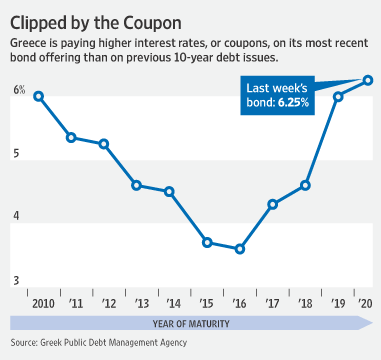By CHARLES FORELLE and COSTAS PARIS
The high interest rates Greece must pay to borrow money are threatening the county's ambitions to cut its deficit, raising again the specter it may need external aid.
Many in Europe breathed a sigh of relief last week when Greece successfully sold €5 billion ($6.85 billion) in government bonds in an auction that saw investors clamoring for the debt. The sale was seen as a key test: The country needs to borrow about €54 billion this year

But debt buyers are demanding higher premiums than officials in Athens anticipated when they planned the 2010 budget, and when they proposed to European Union authorities in January a plan to trim last year's €30 billion budget gap by €9 billion this year.
Indeed, Greece's filings with the EU rest on assumptions implying that this year and next the country will pay an average interest rate of about 4.7% on its new debt. That figure is consistent with the rates paid on existing Greek bonds, mostly issued in better times. But in last week's auction, Greece had to pay 6.25% for a 10-year loan—about three percentage points above what Germany pays for similar debt.
If rates remain high, Greece will have to pay about €700 million more in interest costs this year than it projected, according to Nikos Magginas, an economist at National Bank of Greece. "If the conditions improve—and they have been better in the last two weeks—the deviation could be lower," Mr. Magginas says. "For the time being, we estimate" €700 million.
Such extra interest costs would be painful for a country grappling with unrest as it tries to wring out every excess euro cent from its budget. A move to save €650 million by imposing a 10% cut in government salary allowances was greeted with turbulent opposition and broad work stoppages.
Interest is already a huge line item in the Greek budget, projected at about €13 billion this year. That is more than the government will spend on education, the justice system and police services combined.
In recent days, Greek officials have been warning their counterparts at the European Union that high rates are a problem, in an effort to pressure the EU to go beyond the vague political statement of support made at an EU summit last month.
On Wednesday, a senior government official said Greece could urge international institutions to buy Greek bonds at a set interest rate if borrowing costs are too high, according to the Associated Press.
Deputy Prime Minister Theodore Pangalos said that in the case of "an unjustified speculative attack,'' Greece wants guarantees that international institutions "will come and say: 'Look here, I am buying Greek bonds at this price, with this interest rate,'" the AP reported; Mr. Pangalos didn't say which institutions he was referring to, or elaborate on the interest rate.
The Greeks are hoping a firmer offer of assistance at an EU finance-ministers' meeting next week could reassure potential bond buyers that Greece won't be permitted to default, thus bringing down rates.
"We would like to borrow at more normal rates, or lower rates," Greek Prime Minister George Papandreou told journalists during a visit to Washington this week. There is demand for Greek debt but rates are "still not low enough. And that's not in the long run sustainable."

A Greek official said the government needs "some kind of guarantee for our bonds from our European partners" to bring down rates. "If they don't give it to us and the spreads continue to be so wide, we will likely publicly ask for economic assistance."
That is a step Greece hasn't yet taken, and one that would put the richer euro-zone countries in a dilemma: Say no, and risk a Greek collapse that could reverberate throughout the currency union, or say yes over the objections of reluctant citizens. Germans, who would foot much of the bill for any bailout, are emphatically opposed.
In what is playing out as a game of high-stakes brinksmanship, the EU is leaning on Athens to make cuts and raise levies ahead of significant borrowing needs this spring, when Greece needs to raise more than €20 billion through debt issues. Athens is scrambling to put the measures in place while also angling for extra support to help contain borrowing costs.
An EU spokesman said Greece is "on track" to meet its goal of cutting the deficit from the equivalent of 12.7% of gross domestic product last year to 8.7% this year, and then below the EU's 3% limit by 2012.
In a progress report to the EU published Wednesday, the Greek finance ministry said "very high yields" will "probably lead to a revision in the budget interest payments for the debt in 2010." That would raise the deficit figure. It didn't quantify by how much, and a ministry spokeswoman didn't respond to requests seeking details.
The Greek official said Athens will seek to raise a further €10 billion through one or two bond issues this month, and between $5 billion and $10 billion through an offering in March or April targeting investors in the U.S. and Asia.
Some of that will go toward replacing the next big bond that needs to be repaid, a five-year, €8.2 billion issue that matures in April. The interest rate Greece is paying on that one: 3.10%.
—Gerald F. Seib contributed to this article
Write to Charles Forelle at
charles.forelle@wsj.com and Costas Paris at
costas.paris@dowjones.com http://online.wsj.com/article/SB1000142 ... 79936.html
